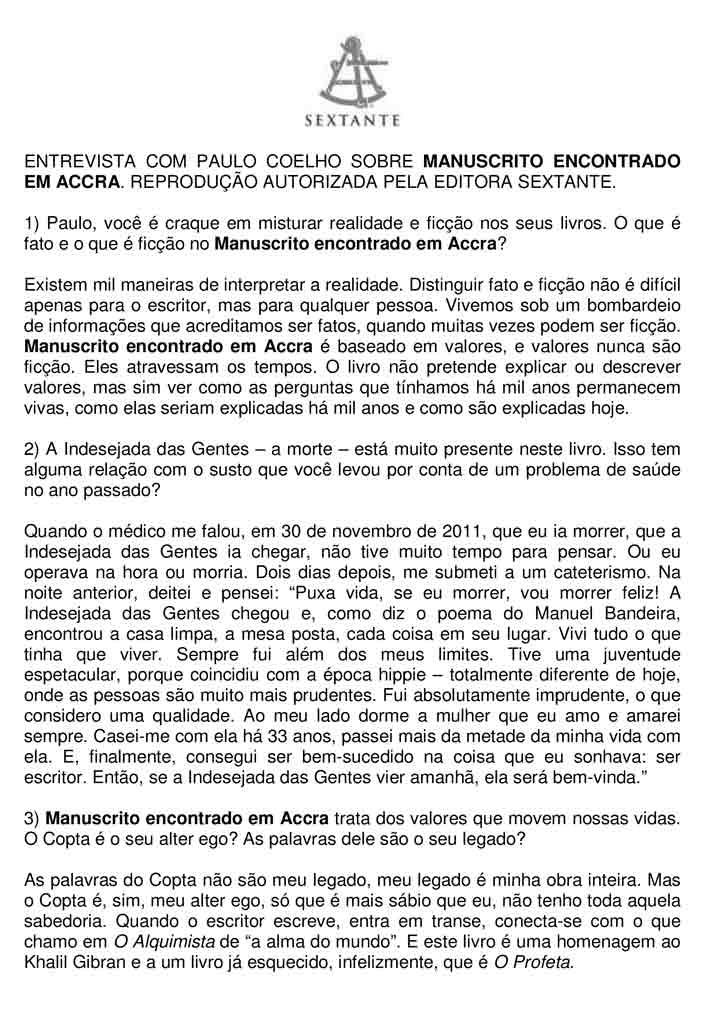

Interview with Brazilian publishers Sextante about the book Manuscript Found in Accra.
There are a thousand ways to interpret reality. Distinguishing fact and fiction is not difficult only for the writer, but for anyone. We live under a bombardment of information that we believe to be facts, when they can often be fiction. The manuscript found in Accra is based on values, and values are never fiction. They go through the times. The book does not intend to explain or describe values, but to see how the questions we had a thousand years ago remain alive, how they would be explained a thousand years ago and how they are explained today.
When the doctor told me, on November 30, 2011, that I was going to die, that the Unwanted People was going to arrive, I didn’t have much time to think. I either operated on the spot or died. Two days later, I underwent a catheterisation. The night before, I lay down and thought: “Wow, if I die, I will die happy! The Unwanted Person arrived and, as Manuel Bandeira’s poem says, found the house clean, the table set, everything in its place. I lived everything I had to live. I have always gone beyond my limits. I had a spectacular youth, because it coincided with the hippie era – totally different from today, where people are much more prudent. I was absolutely unwise, which I consider a quality. Beside me sleeps the woman I love and will always love. I married her 33 years ago, I spent more than half my life with her. And, finally, I succeeded in the thing I dreamed of: being a writer. So, if the Unwanted Person comes tomorrow, she will be welcome.”
Copta’s words are not my legacy, my legacy is my entire work. But Copta is, yes, my alter ego, only it is wiser than me, I don’t have all that wisdom. When the writer writes, he goes into a trance, connects with what I call in The Alchemist “the soul of the world”. And this book is a tribute to Khalil Gibran and to a book already forgotten, unfortunately, which is The Prophet.
What doesn’t come out of my nightstand is my Kindle. There are things that I always reread, like Jorge Luis Borges and the Bible. I also like William Blake very much. I am in favour of you reading a book and then letting it “travel”. When I see a book used by me, it gives me great joy, because I know it was read by several people. I have few recurring readings, but I read a lot. Reading, for me, is one of the great pleasures of life.
The only value to be maintained is courage. When you don’t have the courage, you look for other values that I address in the book. When I decided to write the Manuscript found in Accra, I thought about how nowadays nobody has more courage, nobody dares and everyone has settled down. I don’t “buy” much of the financial and moral and ethical values crises. I think it is precisely because there is a lot of fear of daring that people are more conservative and rigid, whether they are Christian, Jewish or Muslim. Deep down, the world is moving towards religious fundamentalism. There is a Jewish law that says, “Don’t do to your neighbour what you don’t want your neighbour to do to you.” This is the great moral and ethical value to be respected, it is the golden rule. By using Jerusalem as the setting for the book, I want to show that it is perfectly possible to live with the neighbour without trying to impose values.
The future of the book goes through other platforms. I mean, there will be electronic support, there will be support from social networks, we will have many ways to write. But the book will never cease to exist. Nowadays, the writer has a much wider range of possibilities, which must be explored and are not being.
Or rather, they are being exploited by people who are called nerds while intellectuals are complaining about the death of reading – which is nothing new, they always complained about it. You have to be curious, the innocence that William Blake speaks of seeing things as new. When I discovered the social network, it gave me immense pleasure and became a very useful tool. So, the old and the new can not only live together but are inseparable.
New technologies and oral traditions must and can live together. I try to feed my blogs and posts with the stories I learned, from childhood to today, which is the best way to convey any thought. Literature undergoes a radical change in style. Most so-called consecrated intellectuals
is not seeing this. I was surprised by a recent interview with Umberto Eco saying it was against the iPad until I bought one and fell in love. I think it is the fear of the unknown, not only in relation to technology, but in many other things. We have to allow ourselves this innocence, this dazzle or, to use Manuel Bandeira’s expression, this dazzle.
The defeat that motivated me the most was thinking that I would never write, never make my dream come true. At that time, at 39, I was a defeated man, saying that I had dreamed of the impossible. That was my moment of defeat.
Soon after, I took the Caminho de Santiago and went through a radical transformation. I arrived in Santiago de Compostela and thought two things: first, the road does not end here, it starts here; second, I will burn all my sources and dedicate myself to writing. Whether it will work out or not, I don’t know, but I cannot be a defeated man as I was at the beginning of this path. And, thanks to God (God is the God of the mighty), I managed to get where I am. But there is still a long way to go, I haven’t reached the end of my path. I think the end of a writer’s path is when he dies. He always has a new book to write.
The basic challenge I have is to write a new book. But as I write every two years, I start to have other challenges, like living my life according to the values that I think are pertinent, such as simplicity and selflessness, but at the same time having the joy of doing what I feel like doing . Basically, the things that give me the most pleasure are cheap or completely free, like walking or archery. My challenge is always to wake up with a new question in my head, happy, happy to be alive, and not thinking that I have nothing to do or that I have no more challenges or that I have many. Challenges arise every day and, every day, I solve them.
That’s what success is: going to bed each night with your soul at peace. It is to be able to find the Unwanted People and say “I fought the good fight and kept the faith, I did the things I wanted to do, I did it with all the intensity I needed to do. I made a lot of mistakes, I got it right, but the Unwanted People knocked on my door and my soul was at peace ”.

 Back To Top
Back To Top